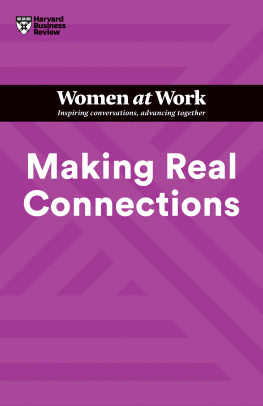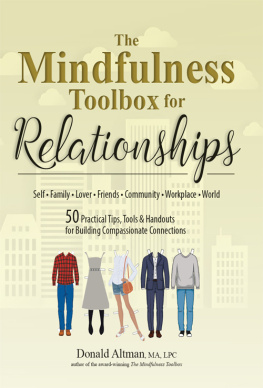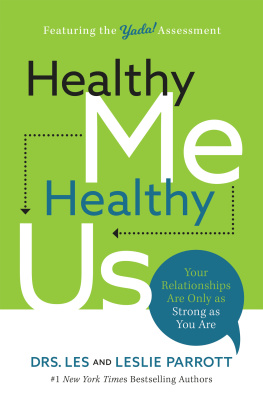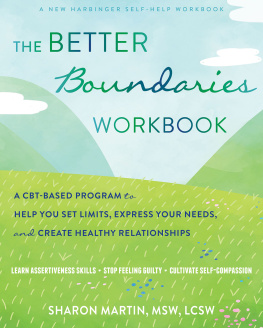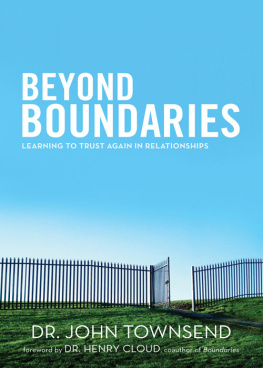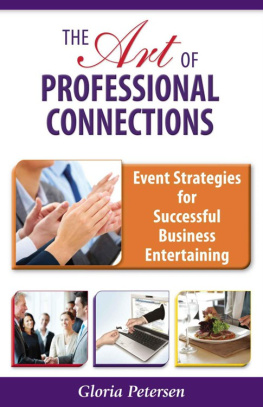Forging Healthy Connections
Praise for Forging Healthy Connections
We have so much knowledge nowmore than enoughto demonstrate to the leaders of the world in all fieldsof the overwhelming importance of deep, meaningful relationships in the healthy development of us all, both as individuals and communities. It is time to begin to apply this knowledgeto make it both understandable and usable. Trevor Crow and Maryann Karinch, in their new work, Forging Healthy Connections, have done their part well in guiding us to embrace a world where healthy relationships are fostered and supported, so that we may thrive as human beings and live well on this earth.
Dan Hughes, PhD Psychologist and author of many books including: Building the Bonds of Attachment, Brain-Based Parenting and 8 Keys to Building Your Best Relationships
Forging Healthy Connections makes clear the profound impact relationships have on our health and well-being. It is an enlightening journey into a world of possibilities for healing and wellness.
Ellen Langer Professor of Psychology, Harvard University, and author of Mindfulness and Counterclockwise


Copyright 2013 by Trevor Crow and Maryann Karinch
All rights reserved. No portion of this book may be reproduced or transmitted in any form whatsoever, including electronic, mechanical or any information storage or retrieval system, except as may be expressly permitted in the 1976 Copyright Act or in writing from the publisher.
Requests for permission should be addressed to:
New Horizon Press
P. O. Box 669
Far Hills, NJ 07931
Trevor Crow, LMFT, and Maryann Karinch
Forging Healthy Connections:
How Relationships Fight Illness, Aging and Depression
Cover design: Charley Nasta
Interior design: Scribe Inc.
Author photo of Trevor Crow courtesy of chrisbaileyphoto.com
Library of Congress Control Number: 2013931894
ISBN 13: 978-0-88282-453-6
New Horizon Press
17 16 15 14 13 1 2 3 4 5
AUTHORS NOTE
T his book is based on the authors research, personal experiences, interviews and real life experiences. In order to protect privacy, names have been changed and identifying characteristics have been altered except for contributing experts.
For purposes of simplifying usage, the pronouns his/her and s/he are sometimes used interchangeably. The information contained herein is not meant to be a substitute for professional evaluation and therapy with mental health professionals.
Contents
T he message from the media is that life clicks along in a series of deals. Sadly, its portrayed as true for our interpersonal relationships as it is for business. We routinely make trades of time, resources and even affection: If you do this for me, Ill do that for you.
Interpersonal relationships are not only critical to happiness, but also to the effective functioningthat is, the healthof individual human beings and organizations of all sizes, from the family to the world. When they become transactional in nature, as they have, we make it nearly impossible for ourselves and our society to enjoy well-being. When deals define a relationship, trouble starts. Not every trade is balanced when it is made. Some things like fidelity, caring, support or the absence thereof cant be easily traded. Treating relationships as transactions distances us from the emotional bonds that enable human connections to thrive.
Relationships are very complicated. They are not bilateral; they take in residue from early childhood and experiences throughout life as well as what we say and do in our daily interactions. When things between us and our loved ones arent working out, its easy to forget that complexity. The knee-jerk response for many people to an interpersonal problem is to blame someonemaybe ourselvesfor doing something wrong. For others, its to ignore the problem. Neither choice is satisfactory. Neither embodies the level of trust that is essential to a healthy connection. The easy answer is often, just get out.
In order to cultivate enduring trust and hopefully fix the problems in our relationships, we need to have compassion for ourselves as well as those with whom we interact. That compassion comes out of understanding what makes us tick. This book gives you the tools to develop that understanding. You will then learn some ways to affect change to strengthen your connections, with the powerful and practical result being that you will feel betterin an emotional and a physical sense.
Forging Healthy Connections offers you well-grounded research and stories of successes and failures to help you gain insights into your body, your emotions and your situation. The bad news is there is no magic bullet. Successful relationships require work. The great news is that success is possible.
Howard H. Stevenson Professor Emeritus, Harvard University, and author of Getting to Giving: Fundraising the Entrepreneurial Way
W e are built for relationships. The need for connection with others permeates the human body.
Emotional bonding profoundly affects the mechanisms inside us that restore health and keep us healthy. The most powerful way to arouse those positive emotions that sustain health and healing is to connect intimately with another human being.
Think about how frightening it is to face a health crisis. Heres an example: One morning, you see a spot on your leg that has changed color and you fear skin cancer. Your left brain kicks in and helps you think through the situation. Skin cancer doesnt run in your family. You dont sunbathe or use a tanning bed. When youre in the sun, you dont burn easily. No, this could not be skin cancer.
But that fear stays in your unconscious mind, affecting you throughout the day. Youre moody. You dont seem to process information or evaluate options with the same clarity you usually do. If someone asked you, Are you afraid right now? you probably would answer, No, but deep down you might not be so sure.
That evening, your partner comes home and immediately gives you a big hug and kiss. You arent aware of it, but something starts to happen in your brain. The fog of fear that lurked low and thick in your unconscious mind all day begins to dissipate. You enjoy your dinner and sleep well that night. You wake up in the morning and say to your partner, I noticed a spot on my leg. Im going to call the doctor and make an appointment today.
Good for you, dear, he says. Thats the way to handle it. Id be happy to go with you.
This simple, ordinary display of caring is exactly the kind of connected behavior that gives the partners immune system a boost.
In this book, we will share some startling insights and the latest scientific knowledge from experts who document the impact of such caring interactions on human health. The research comes from multiple disciplines, but in studying it, we noticed a convergence of ideas, as well as results that reinforce each other. Neurobiology, psychology, immunology, psychiatry, epigenetics, sociology, radiologythese are just some of the disciplines in which researchers and clinicians state this unequivocally: Positive emotional connections boost our capacity to prevent and combat disease. Their complementary points of view and research can open up a new world of understanding for you about the quality of your relationships, how to improve them and the impact of that improvement on your surviving and thriving.
In will guide you in looking introspectively at your own relationships and, hopefully, making discoveries and showing techniques and strategies that will improve them and help you keep connected.
Next page

